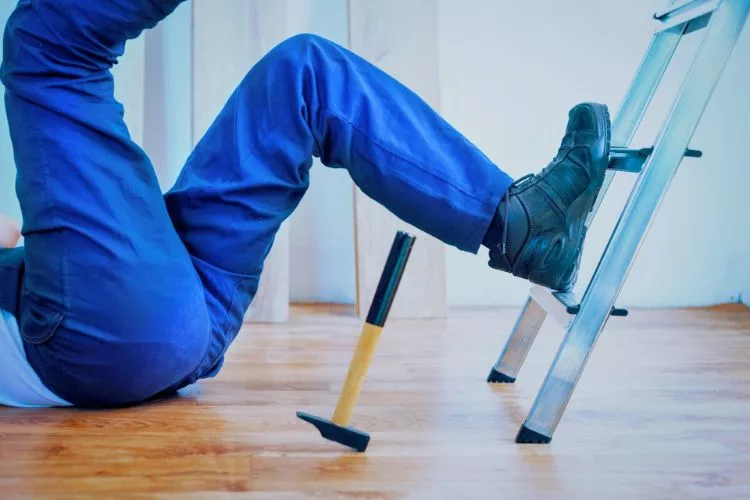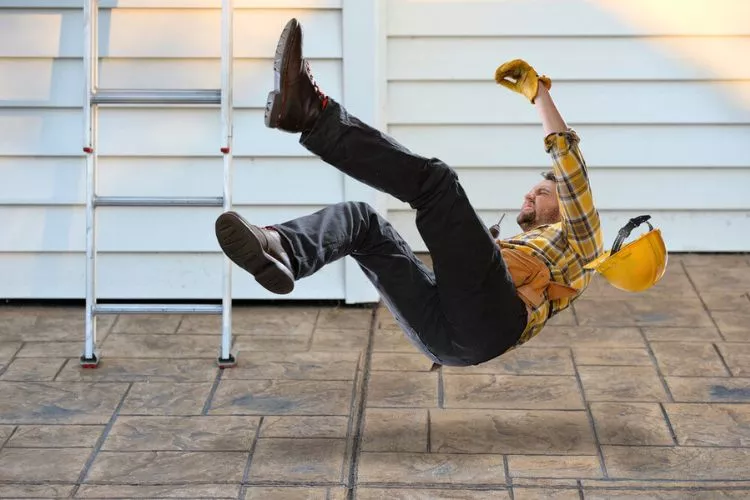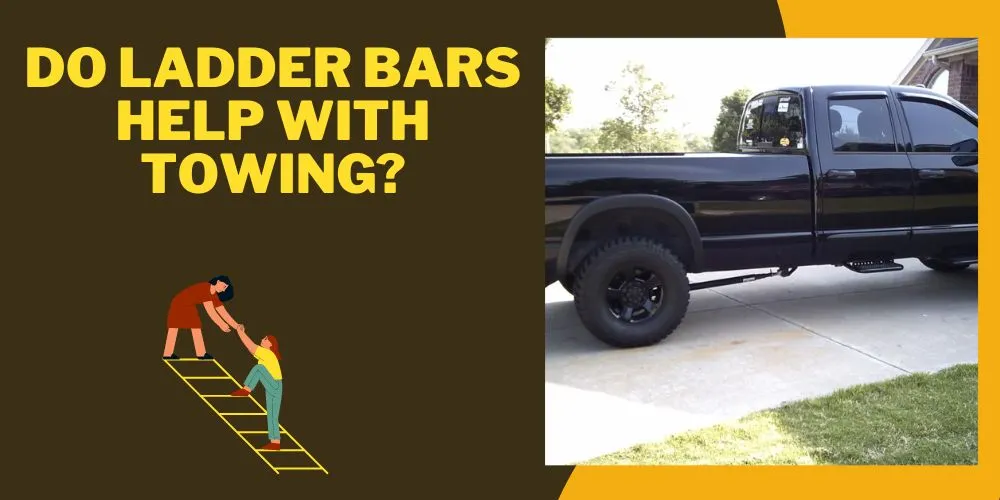In this article, I delve into the often-confusing world of homeowners insurance.
In fact, I will try to address a unique and pertinent question i.e. does homeowners insurance cover falling off a ladder?
Despite homeowners insurance offering protection from various perils, it’s not always crystal clear what falls under this coverage.

With thousands of Americans injured in ladder-related accidents each year, this topic is of crucial importance. Join us as we unravel the complexities of your policy, providing clarity to help you understand just how far your coverage extends.
Does homeowners insurance cover falling off a ladder?
Homeowners insurance generally provides some coverage for injuries sustained from falling off a ladder at home. Most policies include medical payment coverage or personal liability coverage that can help pay for injuries.
Medical payment coverage pays certain medical bills for people injured on your property, regardless of fault.
It may cover the policyholder, residents of the home, and in some cases visitors too. Personal liability coverage helps protect the homeowner if they are sued for causing an accident that injures someone or damages their property.
It would cover legal costs and any settlement or court-awarded damages up to the policy limit.
However, the injury must be accidental and due to negligence on the part of the homeowner for coverage to apply. Intentional injuries are typically excluded.
Who is at fault if a ladder collapses?
Determining who is at fault when a ladder collapses largely depends on the circumstances surrounding the incident. There are several possible factors to consider:

- Manufacturer defect: If the ladder itself had a manufacturing flaw causing it to collapse, the manufacturer could be held responsible for any resulting injuries.
- Improper setup or usage: If the user of the ladder failed to follow proper safety guidelines or the ladder was set up incorrectly—such as on uneven ground or with unsecured support—the person responsible for the setup or using the ladder could be found at fault.
- Property owner negligence: If the property owner was aware of a hazardous condition that contributed to the collapse (e.g., a damaged ladder) and failed to correct or warn about the issue, they may be considered at fault.
- Ladder maintenance: Similar to property owner negligence, if the ladder was poorly maintained, the person responsible for its maintenance could be held liable for the collapse.
A thorough investigation needs to be conducted to accurately determine fault, which may involve a combination of factors.
What are four things not covered by homeowners insurance?
While homeowners insurance provides coverage for many perils, there are certain exclusions and limitations in most policies. Four common things not typically covered include:
- Earthquake, landslide, and sinkhole damage: Standard homeowners policies usually exclude damage caused by these geological events. However, separate, specialized policies or endorsements may be available for added protection.
- Floods: Flood damage is typically not covered by standard homeowners insurance policies. Coverage for this risk may require a separate flood insurance policy, available through the National Flood Insurance Program or private insurers.
- Normal wear and tear: Standard policies generally won’t cover gradual deterioration due to age or neglect, like termites or mold. Regular home maintenance falls under the homeowner’s responsibility.
- Intentional damage or criminal activity: Homeowners insurance won’t cover damage resulting from the homeowner’s intentional or illegal actions, such as vandalism or arson.
What should you not say to homeowners insurance?
When dealing with a homeowners insurance claim, it’s important to be cautious in your communication. Here are some things you should avoid saying:

- Admitting fault or speculating about the cause: Avoid taking responsibility or offering theories about the incident before an investigation is conducted. Stick to the facts and let the professionals determine the cause.
- Downplaying injuries or damages: Be honest about the extent of any injuries or damages. While you might think you’re simplifying the process, you risk undervaluing your claim, which can make it difficult to cover necessary repairs or medical bills.
- Giving a recorded statement without advice: You have the right to review information or consult an attorney before providing a recorded statement. Insurance adjusters might try to find discrepancies or reduce your claim, so be prepared.
- Feeling pressured into a quick settlement: You don’t need to accept an insurer’s first offer. If you’re unsure or believe the settlement isn’t fair, consult with professionals or consider mediation before agreeing to a final settlement.
If someone gets hurt while working on your property, are you liable?
Liability when someone gets hurt while working on your property often hinges on their employment status. Generally, the following scenarios apply:
- Hired professionals: If a professional contractor or worker with their own business liability and worker’s compensation insurance is injured on your property, their insurance typically covers them. Always confirm any hired professionals have adequate insurance coverage before they start work.
- Independent handymen or casual labor: Unlike professional contractors, these workers might not come with their own insurance. If they’re injured on your property, you might be held liable. However, your homeowners insurance may provide some coverage under its liability section.
- Friends, neighbors, or volunteers: If these individuals volunteer to help and they get hurt, you might also be held responsible. Again, your homeowners insurance liability coverage may assist.
While your homeowners insurance provides some coverage, it may not cover all cases, and there can be limits to compensation. Consult your policy or insurance agent to understand your specific coverage.
What are covered and not covered homeowners insurance situations?
Homeowners insurance typically divides coverage into a few sections: dwelling, personal property, liability and additional living expenses. Covered situations under these sections generally include:

- Damage to dwelling or other structures: This includes damage from covered perils such as fire, lightning, windstorms, and hail to your home and structures like garages or sheds.
- Personal property damage: If covered perils damage your belongings inside the home, like furniture or electronics, your policy is likely to cover it.
- Liability: Covers expenses if you or your family members are at fault for injury to others or damage to their property.
- Additional living expenses: If a covered peril makes your home uninhabitable, your insurance can help pay for temporary accommodations.
Common situations not covered in standard homeowners insurance include:
- Flood or earthquake damage: These disasters require separate policies or endorsements.
- Normal wear and tear: Homeowners insurance does not cover maintenance issues or deterioration due to age or neglect.
- Intentional damage or illegal activities: Damage due to intentional or criminal acts by the homeowner is excluded.
- Damage exceeding coverage limits: If the cost to repair or replace your property exceeds your policy limits, you’ll be responsible for the balance.
- Business activities: If you run a business from your home, related equipment, inventory or liability may not be covered.
The specific coverages and exclusions can vary based on your specific policy, region or insurer. Always read your policy thoroughly and consult your insurance agent for any ambiguities.
Conclusion:
Homeowners insurance can potentially cover injuries from falling off a ladder in specific situations, mainly when a third-party is involved. However, it depends largely on the claims circumstances and the terms of your individual policy.
Navigating homeowners insurance can be intricate and entails a keen understanding of what’s covered and what’s not.
Remember, your policy is your contract with your insurance company, so it’s essential to review it in detail. With the right knowledge and coverage, you can enjoy peace-of-mind knowing your home—and the activities around it—are well-protected.


